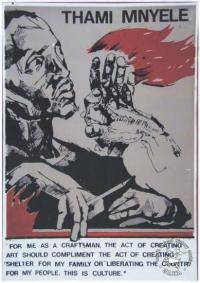
The Black Consciousness Movement and student uprisings, 1970s
Towards the end of the 1960s many black students at tertiary level
were disenchanted with the predominantly-white led National Union of
South African Students' (
NUSAS)
leadership - one of the few remaining vehicles for multi-racial
political activity".21 They felt that the latter, and the white members
of
NUSAS
in general, paid lip service to the total destruction of the Apartheid
government; but they, nevertheless, were content with the status quo
because they benefited from it. The situation reached a boiling point in
1967 at the
NUSAS conference held at Rhodes University, Grahamstown. The
NUSAS'
conference organizers failed to secure accommodation for their black
members in the same venue as the white and Indian members of
NUSAS at the University. Instead, the black members of
NUSAS were accommodated in a church outside the whites' only designated area.
Although it was not
NUSAS's fault that the University followed the government's discriminatory policy to the letter, Biko and his peers felt betrayed by
NUSAS leadership. It was against this background that
SASO
was formed in 1969, and formally launched in 1970 at the University of
the North (or Turfloop University), where Biko was elected its first
president. The Biko's
SASO popularized the Black Consciousness (
BC) philosophy. In December 1971 Biko described the
BC
philosophy as follows "... Black Consciousness in essence ... seeks to
demonstrate the lie that black is an aberration from the ‘normal' which
is white".23 The objective of the
BC philosophy was clearly to instill pride in black people. It was for this reason that
SASO developed the slogan ‘I'm black and I'm proud'. The
BC
philosophy, however, did not remain at the tertiary institutions but
spread to the townships. In 1972 the Black People's Convention (
BPC) was established to cater for the township-based adherents of the
BC philosophy who were not at tertiary institutions.
Mongezi Maphuthi, who had recently moved to Tembisa, remembers that in the early 1970s Black Consciousness (
BC) ideas were already being disseminated in the township. According to him:
"People
like Mthuli Shezi, Thami Mnyele, Mxolosi Moyo, and James Moleya ... were
exponents of the the BC ideas. Shezi even wrote a play called Ashanti. He was
killed at the Germiston train station by boers who pushed him in front of a
moving train."
- Mongezi
Maphuthi
1
Similarly, Greg Malebo recalls:
"We had Ralph Mothiba who was in the Black People's Convention. He
really played a role in shaping our political thinking in that during
the History lesson in particular we'd talk about Kwame Nkrumah, African
Unity, Patrice Lumumba. He'd talk about all those things."
However, it was Thamsanqa ‘Thami' Harry Mnyele more than his
colleagues who seemed to have made a lasting impact on many young people
in Tembisa in the early 1970s. Mnyele was born in Alexandra Township in
1948. While living in Alexandra, he joined Molefe Pheto's Mehloti Black
Theatre. This theatre group included personalities such as Wally Serote
and Michael "Baba" Jordan. Jordan claims that the group's main
objective was to conscientise black people to fight for their rights. It
underscored this goal by refusing to perform in white suburbs and
preferred to perform in townships.
Mnyele's political understanding developed during this stage. Jaki
Seroke, who lived in Alexandra with Mnyele, remembers that Mnyele and
some of his contemporaries like Wally Serote used to engage in serious
discussions about the position of a black person in the racist South
Africa.
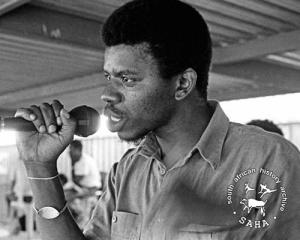
Seroke elaborates:
"Thami Mnyele, when he lived in Alexandra Township, liked jazz and
used to discuss the plight of the black man. Mnyele and others like
Wally Serote used to talk about this issue and sometimes even make a
joke about it, but in a way that they were articulating their views.
"I
mean, they were educated people compared to some of the workers who
were employed in the factories. They had matric; some even had degrees. I
know one of the guys worked in Germiston at the Pass Office as a clerk.
I think he had a B.A. degree in Public Administration. But they were
frustrated. And they would say, in spite of their education, they still
didn't enjoy a good life, because they couldn't get a house. I can still
remember that they would laugh at this guy who worked at the Pass
Office and say that even with his degree he was pushed from pillar to
post by Afrikaners who were not so well educated."
- Jaki Seroke 2
Mnyele was also an artistic painter. He exhibited some of his work in
different townships across the Rand. When the Mnyele family relocated
to Tembisa, Thami became instrumental in mobilizing young people and
conscientizing them. Timothy and Matilda Mabena were some of the young
people recruited by Thami and his fellow
BC adherents.
Matilda Mabena explains how they were drawn closer to Thami's political network:
"There was a group of people who were from Alexandra who were staying
in Difateng section. They approached a few students and informed them
that they wanted to form a social club. This is where we were taught how
to play chess. We would read and practice drama. They also taught us to
play tennis. I can still remember Thami Mnyele used to play tennis.
They then introduced us to jazz and artists like Abdullah Ibrahim, Duke
Ellington, Hugh Masekela, Herbie Hancock. Some of them had already
completed their matric level and others were teachers. We realised later
that some of them were involved in Black Consciousness Movement. Thami
Mnyele, James Moleya, Ralph Mothiba, Obed Raphalla, Mazizi Mbuqe, and
Mike Mthembu were some of the people who opened our eyes. Brian Mazibuko
was also recruited into politics during this period. And he developed
quickly. In 1976 he was the leader during the student uprisings."
Timothy Mabena, adds:
"We would meet in different houses. Mostly we would meet at Thami
Mnyele's place. Sometimes we would stay overnight. At this stage Thami
was working as an artist [for the South African Committee for Higher
Education]. We would sit there and listen to political debates. For
example, they would ask why black people were supposed to carry passes
and yet whites did not. They discussed the forced removals. Why black
people attended schools which were of lesser standard to white schools
in town? Those discussions made us aware that whites and blacks were
living under different conditions."
Lazarus Mawela, who was introduced to Mnyele by
James Moleya in 1976,
remembers that he encouraged them to read and to debate issues.
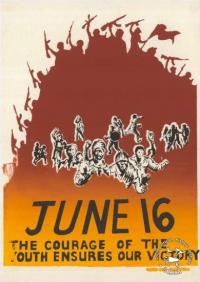
Mawela explains:
"Mnyele demanded that people should read. He'd give you a book and
say, "Next week you must come and tell us about this book." Then we
would have a debate about the book."
Young people who had been in contact with activists like Mnyele, Moleya and others gradually took the
BC
philosophy seriously to the extent that they started discouraging black
females from using skin lotions to lighten their skin. They targeted
them in shebeens.
Gregory Malebo recalls:
"As members of the BPC
we saw our role as conscientising people. Generally we would talk to
them about their blackness; being proud of their blackness. We were
discouraging ladies who were using skin lotions like Ambie. The idea was
to try and instill a sense of pride in them. We realized that the
effect of apartheid was not just chaining people physically but mentally
as well. Our intention was to psychologically free people. In most
cases we would use shebeens like John Moleya's and Mary's, because
that's where we would find many people. We would receive heroes' status
when we arrived in shebeens. You see, we were reading then and so we
were able to express ourselves well in English. People appreciated
that."
BC's influence filled students with a sense of pride about who they were:
"We were not as naïve as the authorities would have loved to think.
You know there were songs like ‘tswang-tswang le bone ngwana o tshwana
le lekhalathi' [Meaning ‘all come out and see our child looks like a
Coloured' in Sesotho]. You see, we did ask ourselves, ‘Why do we think
to be Coloured is more important than what we are?' How can you desire
to be someone you are not?' So we could really put things into
perspective."
At a later stage the
BC's
influence was to encourage secondary and high schools students to
resist the government's decision to impose Afrikaans as a medium of
instruction on them.
The National Party government, through the Department of Bantu
Education, has as far back as 1955 promulgated a policy to have black
students at secondary school level use English and Afrikaans as the
media of instruction (students at lower and higher primaries were
allowed to use their mother tongue). However, it failed to implement
this policy because "... of the shortage of teachers who were proficient
in both languages".35 Seventeen years later the government, again,
attempted to implement this policy. Black schools, from Standard Four
(today's Grade Six) onwards, were given two options: to teach all
examined subjects in English or Afrikaans or to teach both on a 50-50
basis.36 Despite appeals and protests from black teachers' unions, in
1973 the Bantu Education Department (
BED) officials opted for the 50-50 basis policy. In 1974 the Acting Secretary of
BED
sent a circular to regional directors and inspectors, asserting that
the 50-50 use of both official language of instruction in secondary
class would be maintained.
Michael Figo Madlala recalls the difficulty they experienced learning in Afrikaans:
"In Tembisa, students' concern over the use of Afrikaans began in
1973. In 1973 I was at Tembisa High doing my Form 1. My subjects were
Maths, Arithmetic, History, and Geography, and Health Studies, and
Agriculture, and Languages: Isizulu, English and Afrikaans. Other than
the Afrikaans language, the other subject which we were taught in
Afrikaans was Agriculture, Die Landbou. Teacher Molala taught us this
subject. The first day in class he asked us ‘Wat is die grond?' (What is
the soil?) How do you explain what soil is in Afrikaans? And
communication was difficult because we had to respond in Afrikaans.
[Someone] said ‘Die grond is bietjie things' (Soil is very small
things). We could not explain, ‘Wat is die grond?' Then he read it out
for us in the book what soil is in Afrikaans. But still we could not
understand what that was."
- Michael Figo Madlala 3
Afrikaans was not only perceived as a difficult language to learn,
but was also understood by students as a language of the oppressor.
Greg Malebo remembers:
I [was] doing Form 1 in 1974 ... You know, because Afrikaans was seen
as an oppressive language ... many people hated Afrikaans. In fact, the
majority of people in our class did not really want Afrikaans. The
argument was that what [were] we going to do with Afrikaans? It was not
an international language. We were unhappy.
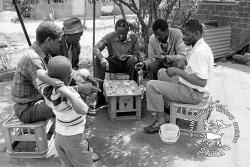
Students began to display their dissatisfaction as early as February
1976. Students at Thomas Mofolo Secondary School in Soweto clashed with
their principal over the use of Afrikaans as a medium of instruction.40
In May Form Two (today's Grade 9) students at Phefeni Junior Secondary
School in Soweto boycotted classes. On June 13 students in Soweto,
comprising members of the South African Student Movement (
SASM),
a secondary and high school student organization, met to discuss the
issue of Afrikaans as a medium of instruction in black schools and to
formulate ways in which other schools could support schools like Thomas
Mofolo and Phefeni Junior Secondary. It was in this meeting that Tsietsi
Don Mashinini is said to have suggested a mass demonstration on 16 June
1976 by all black schools in the township.42 On 16 June thousands of
students from different schools marched in the streets of Soweto,
carrying placards denouncing Afrikaans.
The police responded with brutal force, shooting and killing 13 year
old Hector Pieterson. The student uprising spread to other areas. In
Tembisa, students took to the streets in solidarity with students in
Soweto on 17 June.
Michael Figo Madlala recalls:
"[On the 16th] we finished the day normally. It was on the 17th the
headlines were in the newspapers ‘There's a march that had taken place
in Soweto'. That was when in the morning at the assembly there was a
feeling [that] something was going to happen. And very quickly the word
was going around. We were then [directed] to a classroom where we then
discussed as students the situation as it was happening in Soweto. Of
course, there were a number of [politically conscious students] who were
involved. You could sense from the way in which they were
participating. One of these people who were in the leadership was
Absolom Mazibuko. [In] that meeting we resolved that we [were] also
going to march. And we said our march would go to Boitumelong Senior
Secondary School because they were also affected by Afrikaans."
- Michael Figo Madlala 3
Just like in Soweto, police responded with force. Madlala, adds:
"We had already moved from Tembisa High. We were close to
Boitumelong. We were somewhere in Mashimong [section] when we were
disrupted. The police tear-gassed us and unleashed dogs on us. Students
started running helter -skelter. [We] ran into a toilet. We got into a
toilet - I'm sure we were about 15, if not 20, in one toilet. It was
easy to go in but when we had to get out we couldn't because we were
pressing the door out."
- Michael Figo Madlala 3
In the end, a number of students were arrested. Madlala continues:
"I think around the 21st we were then arrested. We were meant to have
a meeting at school and the police encircled us. About 300 of us were
arrested. And some [were discharged], then 105 of us were charged with
public violence, alternatively arson. Our cases were then divided into
three. Some were charged with three public violence; some with two
public violence; and others [were charged] with only arson. If you were
charged with public violence they would always put an alternative
[charge of] arson."
- Michael Figo Madlala 3
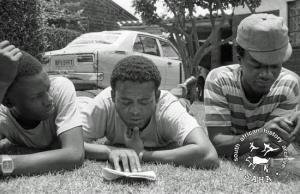
Madlala
and Brian Mbulelo Mazibuko were charged with sabotage and sentenced to
five years on Robben Island. The two were to play a leading role in the
formation of political structures in Tembisa in the 1980s.
In 1976 some of the students from Tembisa fled into exile to join the
ANC. Andrew and Thabo Maphethu, sons to Reverend Phenias Maphethu were amongst those who left the country.
Less than a month (on 5 July) after students erupted against the use of Afrikaans as a medium of instruction, the
BED Minister, M.C. Botha, publicly announced the department's decision to rescind the policy of 50-50 basis media of instruction.
1. Interview with Mongezi Maphuthi by Tshepo Moloi, for the SADET Oral History Project, Tembisa, 28 September 2004.
2. Interview with Jaki
Seroke, conducted by Tshepo Moloi, Cosmo City, Johannesburg, 11 November
2011 [Tshepo Moloi’s private collection].
3. Interview with Mike
“Figo” Madlala by Tshepo Moloi, for the South African Democracy
Education Trust (hereafter SADET) Oral History Project, Kempton Park, 7
September 2004.
*This Article is unedited (we decided to feature it here to give
it a bigger voice - Originally it was published on SAHA website).















.jpg)